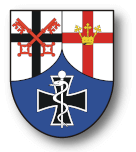
Health Information
Department B1: Management of Analogue Health Documents

Main mission of Department B 1 is the statutory archiving of Bundeswehr health documents.
The growing archive currently contains more than 40 million health files on paper or microfilm. These files include, among other things, the complete health history of all Bundeswehr personnel from its establishment in 1955 to the present day.
Tailor made archiving concepts and specially developed archiving systems, make all these files accessible for patient information, health reporting, and scientific research at short notice.
Because: “Good archiving means not having to search.”
Contact: Günter Koßmann
Department B2: Management of Digital Health Documents

The sustainability of the Bundeswehr Medical Service is closely linked to the ongoing digitalization of healthcare. Department B 2, in collaboration with IT working groups of the respective Bundeswehr institutions in charge of digitalization, is developing sustainable concepts and processes for digital archiving and usage of health data and documents.
In addition to quick and easy access to high-quality data, Department B2 is developing electronic registries (e.g. for epidemiological analyses of training and mission) as a solid data base for decision making and consulting.
One approach is the electronic acquisition, storage, and analysis of data on mission related illnesses and injuries. This is intended to open up new ways for evidence based improvement of military medicine and to set trends for joint ventures with NATO allies.
Contact: Oberfeldarzt Alexander Burgdorff
Department B3: Information about Patients

Department B 3 is the central medical information provider in the Bundeswehr. It has access to all archived, individual health documents and fulfills the statutory mission of providing information to eligible persons (mostly veterans) and institutions.
Operating in strict compliance with data protection laws and guidelines, department B3 caters to more than 30,000 requests per year.
Additionally, it provides support in case of financial damages occurred to the Bundeswehr (e.g. third party liability of injured soldiers).
The department also documents and medically assesses cases of death in active personnel.
 Download information sheet
Download information sheet
to request medical records (German)
Contact: Kai-Uwe Spaniol
Department B4: Epidemiology and Health Reporting

Department B 4 informs the Federal Ministry of Defence, higher commands, and the health facilities of the Bundeswehr Medical Service (as well as the defense committee, the Parliamentary Commissioner for the Armed Forces or similar institutions) about occurring health problems and services provided by the Bundeswehr Medical Service. For this purpose over 400 “tailor-made” health reports are compiled and distributed every year.
In addition, Department B 4 is able to prepare epidemiological reports on anthropometrical data, incidences and prevalences of illnesses, injuries, and fatalities.
In the future, the department will provide an important function for the evidence based advancement of the Bundeswehr Medical Service: It will support the ongoing digitalization of health care as well as the establishment and evaluation of health registries.
Contact: Oberfeldarzt Dr. Andreas Otto
Department B5: Service for the Organization of Postexposure Medical Examinations of the Bundeswehr (ODIN Bw)

In Germany, every employee who has been exposed to carcinogenic agents, dusts, or radiation during their working life is entitled to lifelong post exposure prevention services.
Department B 5 fulfills the statutory mandate for the Bundeswehr and supports the employer in his duty of care beyond the end of employment.
The necessity for lifelong preventive care can be illustrated by the exposure to asbestos, which can lead to chronic pulmonary sickness or tumors decades after exposure.
Contact: Kai-Uwe Spaniol

 Deutsch
Deutsch English
English



